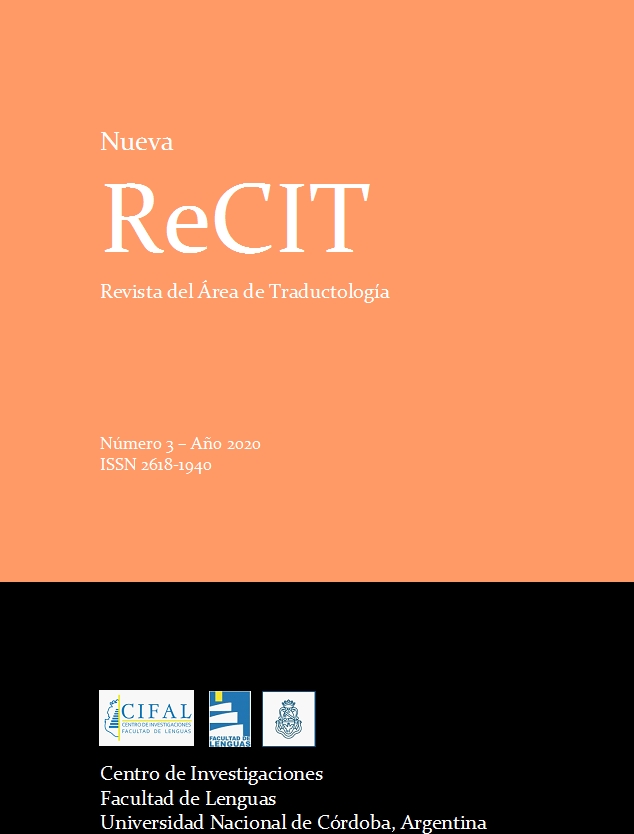Translating Palestinian Women: Re-memory and the Subaltern Geo-Politics of S/Place
Palabras clave:
palestinian women, feminist translation, rememory, intersectionality, subaltern geo-politicsResumen
This paper deals with the translational rememory of Palestinian women’s aesthetic activisms and their crossing of bounded borders, generational boundaries, inter-lingual and cross-cultural parameters in activist reclaim of lost places, unspeakable spaces and unspoken-of maternal legacy of Palestinian rememory and re-membering. The paper particularly examines both the generational model of Arab (Egyptian-Palestinian) women’s aesthetic activism and the third wave paradigm of feminist translational theorization to showcase the limitation of the postmodern feminist politics with their enmeshment in the postmodern organization of space, «[de-]territorial discourse of peace» (Newman, 1996, p. 328) and what Chance critiques as «the androcentric slide into gender as a trope in postmodern translation theory» (Flotow, in Kuhiwczak & Littau, 2007, p. 95). Opening a repertoire between Western feminist translation theory, especially in its paradigmatic shift towards performativity and paratextuality (Flotow, 1996, 2007, 2009; Littau, 2000; Castro Vázquez & Andrews, 2009; Castro Vázquez, 2013), black feminist theoretical insights into re-memory and intersectionality (Morrison, 1989; Crenshaw, 1989) and the still undertow turn into mediality in translation studies (Littau, 1997, 2016; Pérez-González, 2014), the paper reads the translational resignification of Sahar Hamouda and Hind al-Fitiany’s rememories in Once Upon a Time in Jerusalem (2010) and Radwa Ashour’s الطنطورية (al-Tantourieyyah, 2010) into Kay Heikkinen’s The Woman from Tantoura (2014). The paper examines the implication of the translational re-signification with respect to the questions of political geography, geographical identity and what Smith (2012) formulates in terms of subaltern geopolitics of identities. The paper approaches translation as both a trope for feminized rewriting of Palestinian diasporas and an actual practice embedded the materiality of communication, the mediality of transposition (Littau, 2015) and seriality of translating Pandora’s tongues (Littau, 2000). The paper argument is multi-fold: first, the intersectionality of Palestinian women’s positioning and re-memory as the media for communication and configuration of the maternal legacy of space and place. Ashour and Hamouda’s narration projects are spurred by the kindred spirit of matriarchy that leads Ashour to fictionalize her share of Palestinian women-specific stories of diaspora, and drives Hamouda to convert her Palestinian mother’s account from orality into textuality. Second, the paper argues for the materiality of signification in Hamouda’s text and its structuring of subaltern geo-politics of space and place. The latter re-members the occupational divide of political geography through both serialized (collaborative) rememories of their placed identity as Jerusalemite and visual construction of peopled land and image populated narrative space —against the de-population and mythical de-peopling of the land without a people. Third is the power politics of inter-lingual/cultural ideological mediation of space and place in the English translation of Ashour’s novel. This ideological mediation sets the de-framing (de-mapping: actual omission of maps) of the geographicity and historicity of the narrative in tune with the de-territorial discourse of peace, post-modern organization of space and the postmodern feminist politics —with its occlusion of the difference between women and the question of nation for a «nation without a state» (Smith, 2012, p. 20). Finally, the paper argues for the Palestinian feminist politics of S/Place, whose localized geographical identity becomes the point of departure to rewriting histories, re-membering dismembered geography, and un-speaking the unspeakable Palestinian ‘right to return’.
Descargas
Publicado
Número
Sección
Licencia
Aquellos autores que deseen publicar en Nueva ReCIT aceptan los siguientes términos:
• Los autores conservarán sus derechos sobre el texto entregado y garantizarán a la revista el derecho de primera publicación de su obra. Dicho derecho estará simultáneamente sujeto a la licencia Creative Commons, la cual permite que terceros compartan la obra siempre que
se mencione al autor y al lugar de la primera publicación.
• Los autores realizan una cesión de derechos no exclusivos, lo que implica que la publicación de los artículos en Nueva ReCIT no impide al autor publicar su texto, a posteriori, en otras revistas u órganos editoriales; asimismo, los autores autorizan que el trabajo sea depositado en repositorios institucionales, como el Portal de Revistas de la Universidad Nacional de Córdoba o el Repositorio Digital de la Universidad Nacional de Córdoba.

